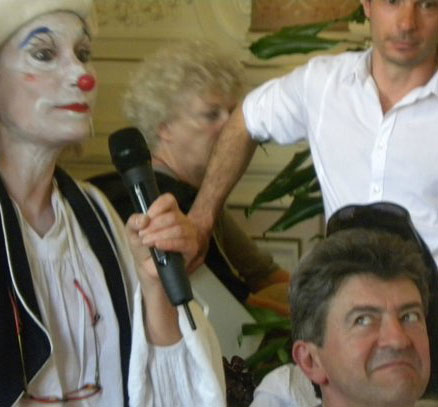WOID XX - 04.
The Culture Candidate.
Jean-Luc Mélenchon gets no respect - is it because he somewhat resembles Rodney Dangerfield, or just because, as France's leading left-wing candidate for next year's presidential elections, he's already been fingered as the designated loser by the French establishment press?
Since the rightwing position in the area of Culture (in France as in America) extends far into the radical Left it's refreshing to read Mélenchon's position on his blog - straight from the Avignon Festival, one of the major cultural attractions of the French tourist season.
I considerably abbreviated the original and simplified Mélenchon's language, an insistent mix of day-to-day populism and sharp analytical skills that reminds me of the great nineteenth-century writer Jules Vallès and his impossible mission to write for ordinary French people in a language designed for their masters. Mélenchon writes - or tries to write, or has someone write for him - like a proletarian with a brain, which in itself should cause the undying rage of all those, left or right, who think a proletarian doesn't, or shouldn't, have one.
- PW.
Not a word from the papers about our meeting of the Left Front for Culture that brought in over four hundred people, unlike the two hundred participants brought in for the Socialist Party’s meeting which had the advantage of including the respectable orders of society and their usual mirrors in the media. The Socialist candidates came to promise a free lunch to those they consider the army of their constituents, present and future: their cultural policy boils down to the allocation of public resources. Their political discourse seems entirely scripted by the unions [viz., those unions that represent the cultural sector of the workforce].

We are living today in a global order whose links and consent mechanisms are cultural. There is no "Crisis of Culture" in the sense that Culture is endangered. Debate about the marginal status of cultural activity is an academic cliché unrelated to those cultural policies that must be formulated by the Left. The cultural influence of the System is felt everywhere, the aestheticization of dominant values is beyond anything ever experienced in the past, no mechanism for growth or cultural production can escape its logic.
This does not merely concern standardized production, but also, and especially, taste and demand: citizens of the globalitarian world are absorbed into a hierarchical order that organizes consumption according to priorities that are aesthetic, not utilitarian. […] Those who buy, not the suit, but the youthfulness promised by the suit, absorb at once the deprivation imposed by commodities and the imagined rewards of that deprivation. Our problem is not freedom to create but the impediments to non-compliant production.
Our humanity is at stake, as well as our capacity for emancipation: as long as we are glued to the requirements of the dominant culture there is nothing left for us but to become willing cogs in the system. We can return to out true selves - emancipate ourselves - only by escaping the hand that controls us; only by producing a counterculture that holds at bay the globalitarian culture that has invaded and absorbed us. Progressive minds cannot reduce their thought and praxis to the advocacy of additional resources for popular cultural activities, or to proclamations for total creative freedom. The intentions behind such advocacy must be questioned. It’s not enough to plan the party, you’ve got to demand new tunes to dance to.
I don’t know if this oppositional culture, in the sense I intend, will emerge; perhaps I don’t know how to find it where it exists already. Here again is the basis from which I spoke earlier about the task of journalists: there is no production independent of its material conditions. Here, also, the starting-point is the social conditions of producers, followed by the search for a system of property relations to be set in opposition to the financial capitalization of the cultural sector – you see, I’m not backing away from the “concrete” aspect of cultural issues. But I maintain that such actions are entirely determined by the meaning we want to give them, and this is why, at this particular point, I insist on our goals. The contribution of arts and culture to a citizens' revolution lies in its subversion of the content of cultural practices and in changing the social status of producers.
In the field of cultural production the Citizens' Revolution will reinstate popular sovereignty over institutions; will rephrase the dominant model of property relations as it affects culture; and will reorganize the hierarchy of values that structures it. In order to revive this vision and our opposition to the present situation, we call attention to the hidden dimensions of the cultural sector, proof of its blind involvement with the dominant order of things. [...]
On the ”front lines of culture” as I define them stand many social movements; some are organized and settled; others, spontaneous, temporary, evolving: […] associations of free-lance artists, unions, organizations for popular education, for instance, […] not to mention individual acts of resistance within the cultural system itself; but one shouldn’t imagine these are deadly attacks on the system: [ …] there is no territory “outside” the system of the globalitarian order, literally or figuratively. […] The decisive blow will come with the upending of the political system itself.
http://www.jean-luc-melenchon.fr/2011/07/18/d’avignon-vers-la-crise
blahblah